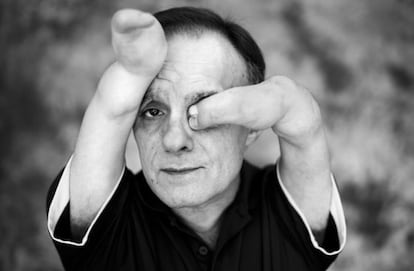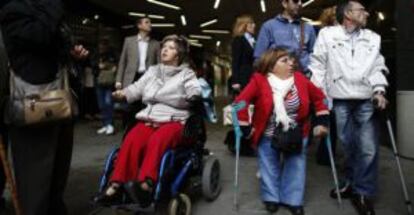Supreme Court denies compensation to Spain’s “thalidomide babies”
People born with severe deformities due to drug say they will go all the way to Strasbourg

Spanish victims of thalidomide will not receive compensation from Grünenthal, the German company that manufactured the drug in the 1950s.
Thousands of babies born to women given thalidomide to combat morning sickness were born without arms and legs in the 1950s and 60s throughout the world.
A court had originally ruled in favor of Avite, the Spanish Association of Thalidomide Victims, which filed a suit in 2012 asking for €204 million in damages.
It’s clear nobody is going to do anything for us, certainly not this government. So we have to do our own fighting”
Rafael Basterrechea, vice-president of Avite
The original ruling awarded compensation to just 20 of the 186 victims who were suing for damages. The amounts ranged from €660,000 to €1,980,000.
That early ruling limited payments to those people recognized by the government in a 2010 royal decree as victims of the drug and compensated by the Spanish state. However, it excluded people who received money from the Contergan Foundation, established in Germany in 1971 to compensate thalidomide victims. Grünenthal paid 117 million deutschmarks into this fund.
But the drug maker appealed the Madrid court's decision, and in October 2014 the Madrid provincial court overturned it.
Now, the Supreme Court has ratified that these victims are not owed compensation because the statute of limitations on the case has run out.
Eight of the Supreme Court justices entered a negative decision for the victims, while a sole justice voted in favor of compensation.
The ruling is based on the fact that the drug was taken in the late 1950s and that any period for legal action has prescribed. The plaintiffs claim that they were not officially recognized by the state as victims until 2010, under the Socialist administration of José Luis Rodríguez Zapatero, and were thus unable to file their suit until then.
The Supreme Court acknowledged that the plaintiffs’ severe deformities were caused “without a doubt” by thalidomide. It also left the door open to future civil lawsuits.
“I’m a little bit ashamed of being Spanish,” said Rafael Basterrechea, vice-president of Avite. “Out of 47 million Spaniards, there are probably only 11 people who understand this ruling.”
Following the first ruling by the lower court, the German pharmaceutical firm issued a statement stressing that there were already “specific and efficient means” for all victims to seek economic aid.

But the fight is not over, Basterrechea warned.
“Now we have to deal with this blow, but we still have the Constitutional Court and the European Court of Human Rights in Strasbourg,” he noted. “The thing is, we are growing tired. Every proceeding means years and money. In the end, we will win when we are 80 years old or when we’re dead, and our children or grandchildren will get the compensation.”
“All that’s left for us to do is to take a deep breath, grit our teeth and keep moving forward,” he added Basterrechea. “It’s obvious that nobody is going to do anything for us, certainly not this government. So we have to do our own fighting.”
English version by Susana Urra.
Tu suscripción se está usando en otro dispositivo
¿Quieres añadir otro usuario a tu suscripción?
Si continúas leyendo en este dispositivo, no se podrá leer en el otro.
FlechaTu suscripción se está usando en otro dispositivo y solo puedes acceder a EL PAÍS desde un dispositivo a la vez.
Si quieres compartir tu cuenta, cambia tu suscripción a la modalidad Premium, así podrás añadir otro usuario. Cada uno accederá con su propia cuenta de email, lo que os permitirá personalizar vuestra experiencia en EL PAÍS.
¿Tienes una suscripción de empresa? Accede aquí para contratar más cuentas.
En el caso de no saber quién está usando tu cuenta, te recomendamos cambiar tu contraseña aquí.
Si decides continuar compartiendo tu cuenta, este mensaje se mostrará en tu dispositivo y en el de la otra persona que está usando tu cuenta de forma indefinida, afectando a tu experiencia de lectura. Puedes consultar aquí los términos y condiciones de la suscripción digital.








































